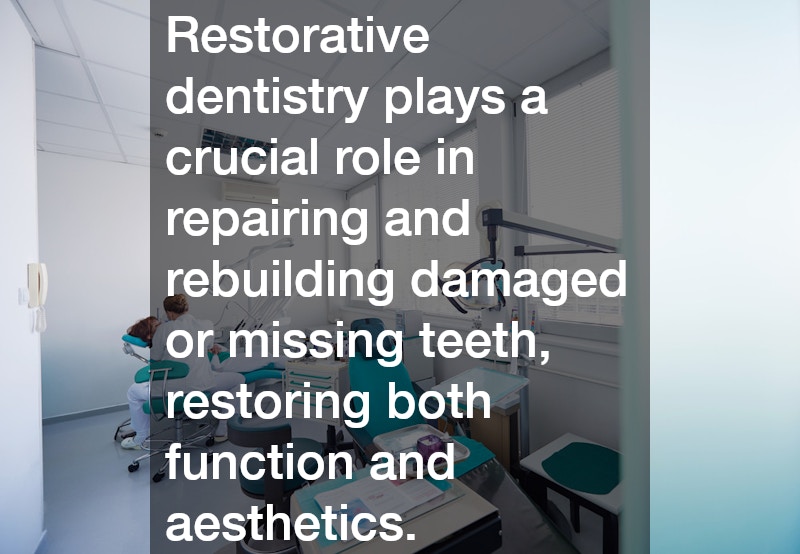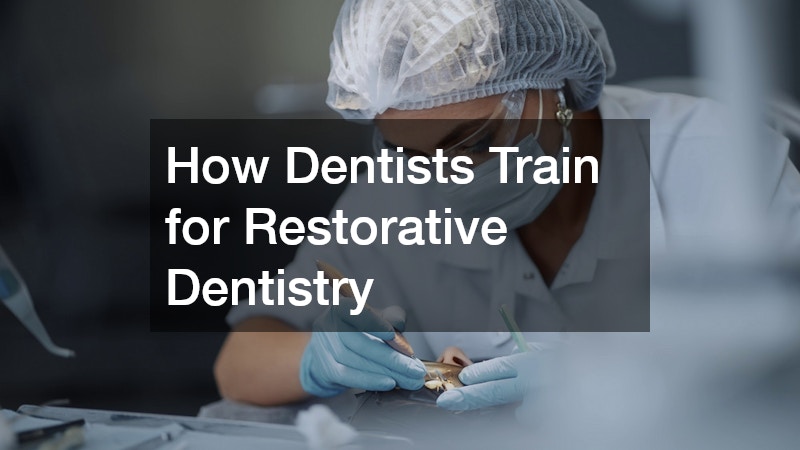
Restorative dentistry plays a crucial role in repairing and rebuilding damaged or missing teeth, restoring both function and aesthetics. Behind every successful restorative procedure is a dentist with years of specialized education, hands-on experience, and a commitment to continual learning. This article explores how dentists train for restorative dentistry, the essential skills required, and how this expertise benefits patients seeking long-term oral health and confidence.
What is Restorative Dentistry?
Restorative dentistry focuses on diagnosing, preventing, and treating oral diseases that compromise the integrity of teeth and supporting structures. It encompasses everything from simple fillings to complex full-mouth reconstructions, combining science, artistry, and precision.
The primary goal of restorative dentistry is to return damaged or missing teeth to optimal form and function. It bridges the gap between general dentistry and advanced specialties such as prosthodontics and cosmetic dentistry, emphasizing the health and longevity of the patient’s natural teeth.
Common Procedures
Typical restorative procedures include fillings, crowns, bridges, inlays and onlays, and dental implants. Each treatment restores tooth structure, improves bite alignment, and enhances appearance. Dentists specializing in restorative dentistry often handle cases involving trauma, decay, or wear caused by grinding or aging.
Why Specialize in Restorative Dentistry?
For dentists, specializing in restorative dentistry offers the opportunity to improve patients’ lives through functional and aesthetic transformations. For patients, it means receiving care that not only repairs teeth but also strengthens oral health and boosts self-confidence.
Trends in Restorative Dentistry
Modern restorative dentistry has evolved with innovations like digital scanning, CAD/CAM technology, and biocompatible materials. Minimally invasive techniques and same-day restorations have become more common, allowing patients to experience faster, more comfortable treatment with lasting results.
Future Outlook
The future of restorative dentistry is closely tied to digital technology and biomaterials. Advances such as 3D-printed restorations, regenerative tissue therapies, and AI-driven diagnostics promise to make treatments more precise, efficient, and personalized.
How Do Dentists Train for Restorative Dentistry?
Becoming proficient in restorative dentistry requires years of education, clinical practice, and continual skill development.
Educational Requirements
Dentists begin by earning an undergraduate degree, typically in a science-related field, followed by a Doctor of Dental Surgery (DDS) or Doctor of Dental Medicine (DMD) degree from an accredited dental school. Coursework includes anatomy, physiology, pathology, and materials science, all essential for restorative treatment planning.
Clinical Training
Hands-on experience is a cornerstone of dental education. During clinical rotations, students practice procedures such as fillings, crown preparations, and impressions under faculty supervision. These experiences build technical skill, patient interaction abilities, and confidence.
Licensing and Certification
After earning a dental degree, dentists must pass both national and state board exams to obtain a license to practice. Some may pursue additional certifications in restorative or prosthodontic disciplines, validating their expertise in advanced restorative care.
Residency Programs
While not mandatory for general practice, residency programs in advanced restorative dentistry or prosthodontics offer intensive training. These programs focus on complex restorations, full-mouth rehabilitation, and integrating cutting-edge technology into patient care.
Continuing Education
Dentistry is constantly evolving, making ongoing education essential. Dentists attend workshops, seminars, and certification courses to stay updated on new materials, digital workflows, and innovative restorative techniques.
What Skills are Essential for Restorative Dentistry?
A successful restorative dentist combines technical precision with strong communication and problem-solving skills.
Technical Skills
Precision is vital in restorative dentistry. Dentists must master techniques for tooth preparation, impression-taking, and restoration placement to ensure lasting results and proper bite alignment.
Diagnostic Ability
Accurate diagnosis forms the foundation of effective restorative care. Dentists use X-rays, digital scans, and clinical assessments to determine the extent of damage and develop comprehensive treatment plans.
Communication Skills
Clear communication helps dentists explain complex procedures, set realistic expectations, and build trust with patients. Collaboration with dental technicians and specialists also ensures seamless treatment outcomes.
Manual Dexterity
Dentistry requires exceptional hand-eye coordination. The ability to perform intricate work in confined spaces ensures restorations are functional, comfortable, and aesthetically pleasing.
Problem-Solving Skills
Each restorative case presents unique challenges. Dentists must analyze the patient’s oral condition and customize treatment strategies that balance function, durability, and visual appeal.
How Can Patients Benefit from a Dentist Trained in Restorative Dentistry?
A dentist trained in restorative dentistry brings both technical skill and aesthetic judgment to every procedure, enhancing the patient’s oral health and quality of life.
Improved Oral Health
Restorative treatments repair damaged teeth, prevent further decay, and restore proper function—ensuring long-term dental wellness.
Enhanced Aesthetics
Beyond functionality, restorative dentistry improves smile appearance by addressing discoloration, chips, or gaps, contributing to higher confidence and self-esteem.
Functionality and Comfort
Properly fitted crowns, bridges, and implants restore natural bite and chewing efficiency, improving comfort and overall oral performance.
Personalized Treatment Plans
Trained restorative dentists tailor each treatment to the individual, considering unique anatomical, functional, and aesthetic needs for optimal results.
Long-Term Care and Maintenance
Comprehensive follow-up and maintenance ensure restorations last for years, preserving both oral health and investment value.
Advancing Smiles Through Expertise in Restorative Dentistry
Training in restorative dentistry equips dentists with the knowledge, precision, and compassion necessary to rebuild and transform smiles. Through rigorous education, hands-on experience, and mastery of modern technologies, these specialists enhance both oral health and patient confidence. As restorative techniques continue to evolve, patients can look forward to treatments that are more durable, comfortable, and beautifully natural—reflecting the art and science at the heart of modern dentistry.



